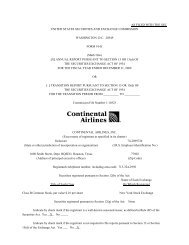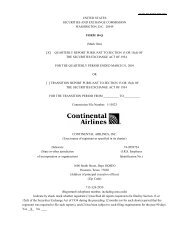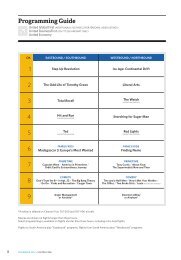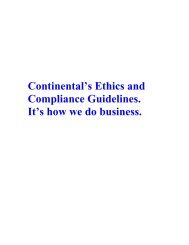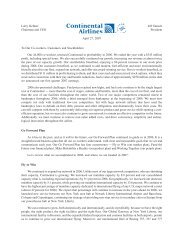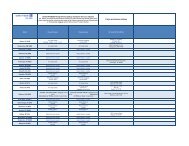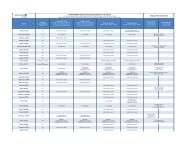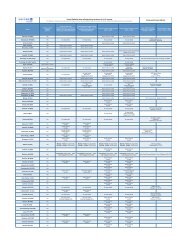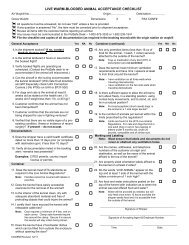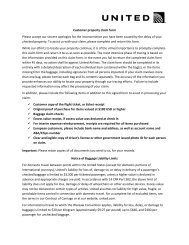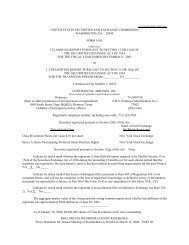ACAA Final Rule.pdf - United Airlines
ACAA Final Rule.pdf - United Airlines
ACAA Final Rule.pdf - United Airlines
Create successful ePaper yourself
Turn your PDF publications into a flip-book with our unique Google optimized e-Paper software.
15<br />
(9) Transportation of a service animal on a flight segment scheduled to take 8 hours or more;<br />
(10) Accommodation of a passenger who has both severe vision and hearing impairments (see sec. 382.29(b)(4)).<br />
(d) If the passenger with a disability provides the advance notice you require, consistent with this section, for a<br />
service that you must provide (see paragraphs (c)(4) through (10) of this section) or choose to provide (see<br />
paragraphs (c)(1) through (c)(3) of this section), you must provide the requested service or accommodation.<br />
(e) Your reservation and other administrative systems must ensure that when passengers provide the advance notice<br />
that you require, consistent with this section, for services and accommodations, the notice is communicated, clearly<br />
and on time, to the people responsible for providing the requested service or accommodation.<br />
(f) If a passenger with a disability provides the advance notice you require, consistent with this section, and the<br />
passenger is forced to change to another flight (e.g., because of a flight cancellation), you must, to the maximum<br />
extent feasible, provide the accommodation on the new flight. If the new flight is another carrier’s flight, you must<br />
provide the maximum feasible assistance to the other carrier in providing the accommodation the passenger<br />
requested from you.<br />
(g) If a passenger does not meet advance notice or check-in requirements you establish consistent with this section,<br />
you must still provide the service or accommodation if you can do so by making reasonable efforts, without delaying<br />
the flight.<br />
§382.29 May a carrier require a passenger with a disability to travel with a safety assistant?<br />
(a) Except as provided in paragraph (b) of this section, you must not require that a passenger with a disability travel<br />
with another person as a condition of being provided air transportation.<br />
(b) You may require a passenger with a disability in one of the following categories to travel with a safety assistant<br />
as a condition of being provided air transportation, if you determine that a safety assistant is essential for safety:<br />
(1) A passenger traveling in a stretcher or incubator. The safety assistant for such a person must be capable of<br />
attending to the passenger's in-flight medical needs;<br />
(2) A passenger who, because of a mental disability, is unable to comprehend or respond appropriately to safety<br />
instructions from carrier personnel, including the safety briefing required by 14 CFR 121.571(a)(3) and (a)(4) or 14<br />
CFR 135.117(b) or the safety regulations of a foreign carrier’s government, as applicable;<br />
(3) A passenger with a mobility impairment so severe that the person is unable to physically assist in his or her own<br />
evacuation of the aircraft;<br />
(4) A passenger who has both severe hearing and severe vision impairments, if the passenger cannot establish some<br />
means of communication with carrier personnel that is adequate both to permit transmission of the safety briefing<br />
required by 14 CFR 121.57(a)(3) and (a)(4), 14 CFR 135,117(b) or the safety regulations of a foreign carrier’s<br />
government, as applicable, and to enable the passenger to assist in his or her own evacuation of the aircraft in the<br />
event of an emergency. You may require a passenger with severe hearing and vision impairment who wishes to<br />
travel without a safety assistant to notify you at least 48 hours in advance to provide this explanation. If the<br />
passenger fails to meet this notice requirement, however, you must still accommodate him or her to the extent<br />
practicable.<br />
(c) (1) If you determine that a person meeting the criteria of paragraph (b)(2), (b)(3) or (b)(4) of this section must<br />
travel with a safety assistant, contrary to the individual's self-assessment that he or she is capable of traveling<br />
independently, you must not charge for the transportation of the safety assistant. You are not required to find or<br />
provide the safety assistant, however.



